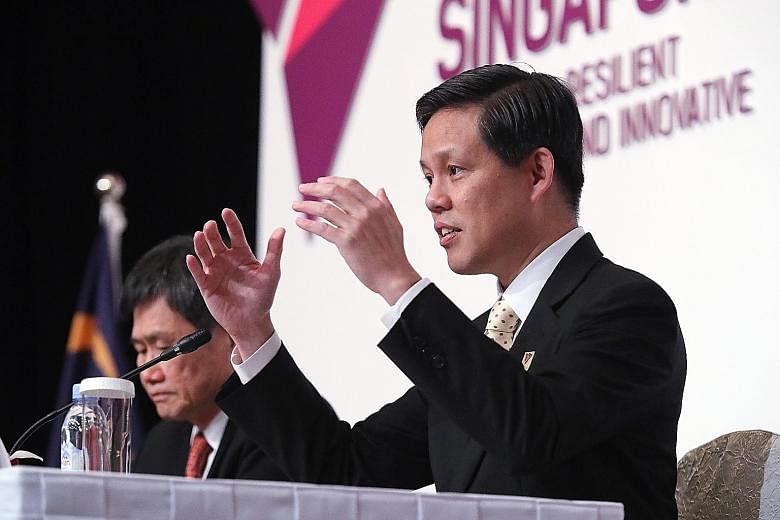Economic ministers from Asean and six other countries made good progress last week at the latest round of talks aiming to create the world's largest trade pact, Trade and Industry Minister Chan Chun Sing said yesterday.
Mr Chan said the countries involved in the Regional Comprehensive Economic Partnership (RCEP) hope to reach a "substantial conclusion" on the trade deal by mid-November, when Asean holds its next summit.
The other signatories of the RCEP are China, Australia, New Zealand, Japan, India and South Korea.
"Good progress was made at this round, with most RCEP participating countries demonstrating flexibility by accommodating each other's needs where possible," he said.
"This resulted in the narrowing of gaps and paved the way forward for negotiators to engage on key outstanding issues. Broad agreement is in sight."
Mr Chan was speaking at a press conference at the end of the four-day Asean Economic Ministers' Meeting at the Shangri-La Hotel.

The meeting also saw the leaders agreeing on several pacts to further integrate Asean economies.
Among them was a scheme to allow certified exporters to self-declare the country of origin for their goods on permitted commercial documents, saving cost and administrative hassle.
For Singapore-based exporters, this will translate to potential annual savings of about $500,000 once the scheme is implemented.
The ministers also endorsed an Asean Agreement on e-commerce, which reaffirms the need to lower costs and improve the speed and reliability of supply chains in cross-border e-commerce transactions.
The Asean economic ministers also met counterparts from other countries, including those from the RCEP participating countries, Russia and the United States.
Speaking to local media after the press conference, Mr Chan said a lot of effort has been put into realising such deals because they open up opportunities for businesses and workers here, which is all the more important, given growing trade tensions.
"There are a lot of uncertainties in the global trade environment. It means that our businesses will be affected... which means that jobs could potentially be affected," he said.
"We must ensure that we continue to build up our links with more countries to diversify our reliance on any one particular market, so that our businesses will not face discontinuity even if there's a disruption in one particular market.
"Being able to save on the cost of doing business across borders makes a lot of difference. We signed this Aseanwide self-certification scheme. Last year alone, more than 80,000 applications were required for our businesses to do business with many Asean partners and each of these applications requires time and money.
"So when we sign such an agreement, it gives our businesses greater opportunities to earn more and gives them greater access to regional markets."
Mr Chan said that between now and the Asean Summit in mid-November, regional ministers and the other participating countries of the RCEP will need to focus on getting the giant trade pact to a substantial conclusion.
This will require each economic minister to secure the necessary political mandates to get the deal towards the finish line, step up negotiations with one another to close their respective differences and be flexible in accommodating one another's specific needs, concerns and interests.
"The last part (of negotiating a trade deal) is always the most critical because that will require the toughest trade-offs," Mr Chan said.
"These are the moments where you really understand each other's needs, difficulties, challenges and sensitivities.
"So it's not just about securing the maximum for ourselves individually but about looking at the entire package and saying, which are the things I can trade off so that I can not only secure my own interests but also help my fellow members promote their interests so they, too, can bring home a package that is acceptable to their people."
Asean leaders have said that they are keen to substantially conclude the pact by the end of this year but India has expressed reservations about having the liberalisation of trade in goods and services without a corresponding liberalisation of the movement of people.


